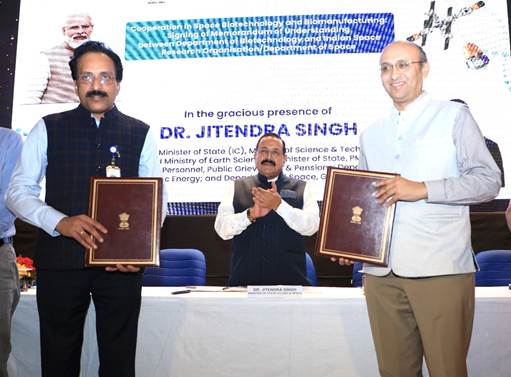New Delhi, October 26, 2024: India will have its own Space Station by 2035, which will be known as “Bharatiya Antriksh Station”.
This was disclosed here today by Union Minister of State (Independent Charge) for Science and Technology, Earth Sciences, Department of Space Dr Jitendra Singh while responding to a query from the media after he announced the signing of a landmark Memorandum of Understanding (MoU) between the Indian Space Research Organisation (ISRO) and the Department of Biotechnology (DBT).

In a significant development, the MoU marks a unique collaboration aimed to integrate biotechnology with space technology, heralding a new era of scientific innovation in India.
Dr Jitendra Singh highlighted the transformative journey of biotechnology, which has traditionally been confined to laboratories, now reaching the vast expanse of space.
He emphasised that this MoU represents a pivotal step towards practical applications of biotechnology, moving beyond theoretical research.
The Minister praised ISRO Chairman S Somnath and Secretary of the Department of Biotechnology Dr Rajesh Gokhale for their efforts in making this collaboration possible.
Dr Singh emphasised on public-private participation, which has been instrumental in the rapid growth of India’s space sector. He credited Prime Minister Narendra Modi for opening up the space sector to private players, leading to a surge in innovation and entrepreneurship. The minister pointed out that the number of space startups has grown significantly, with nearly 300 startups now contributing to the space economy.
He also spoke about the rising prominence of biotechnology, particularly in the wake of the COVID-19 pandemic. He acknowledged the Department of Biotechnology’s role in developing the first-ever DNA vaccine, which brought global recognition to India’s scientific capabilities.
The MoU outlines several key initiatives, including the establishment of a Bharatiya Antariksh Station and the unveiling of the BioE3 (Biotechnology for Economy, Environment and Employment) Policy. This policy aims to foster high-performance biomanufacturing in the country, with a goal of reaching a $300 billion bioeconomy by 2030. The collaboration will focus on areas such as microgravity research, space biotechnology, space biomanufacturing, bioastronautics, and space biology.
This partnership is expected to benefit the national human space programme and spur innovations in human health research, novel pharmaceuticals, regenerative medicine, and bio-based technologies for efficient waste management and recycling. It will also open opportunities for startups in the space and biotechnology sectors to develop commercially attractive technological solutions.
More Stories
Chhattisgarh Received 176.3 MM Rainfall So Far
Chhattisgarh has received good amount of rainfall in all the districts of the state so far this monsoon.
Chief Secretary Amitabh Jain Creates History
Chhattisgarh Chief Secretary Amitabh Jain today created a history in the administrative cadre of the state by getting extension of service.
Sai Cabinet Approves Chhattisgarh State Logistics Policy-2025
For the overall development of the logistics sector in Chhattisgarh, the cabinet meeting held today under the chairmanship of Chief Minister Vishnu Dev Sai approved the Chhattisgarh State Logistics Policy-2025.
Chhattisgarh Input Subsidy Scheme to be Expanded
Taking a major decision in the interest of farmers, Chhattisgarh Cabinet, chaired by Chief Minister Vishnu Dev Sai, today decided to amend the state Krishak Unnati Yojana and expand the scope of the input subsidy scheme.
CM Sai Re-launches Free Shoes Scheme in Chhattisgarh
Chhattisgarh Chief Minister Vishnu Dev Sai today re-launched the ‘Charan Paduka Yojana’ by making women tendu leaf pluckers wear Charan Paduka in Jamgaon of Durg district.
Chhattisgarh CM meets Governor; Discusses important issues
Chhattisgarh Chief Minister Vishnu Dev Sai today met the Governor Ramen Deka and discussed various issues pertaining to the state.


